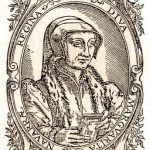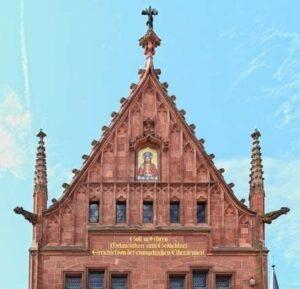The reputation and the fame of Melanchthon extended even to France : he had established a regular correspondence with Guillaume Du Bellay and Jean du Bellay, bishop of Paris who was the elder brother of this famous humanist. Some of his works were published in Paris and in Lyon.
He was estimated as much as a humanist, commentator of Latin and Greek texts, as an author of numerous textbooks on rhetoric, dialectic, philosophy as well as grammars of the classical languages. His Latin and Greek grammars were repeatedly republished in France. The second reason of Melanchthon’s reputation is formulated by Marguerite de Navarre : “this good and holy man, completely devoted to God and to peacemaking, seeks to avoid the violent passions of Luther and Zwingli, and wishes nothing other than to put an end to the differences between the religious confessions… ”
This judgment demonstrates what were the expectations laid onto Melanchthon : he was supposed to be the mediator between the enemy parties, it was for him to relaunch the dialogue between Catholics and Protestants and avoid the imminent split of the Church. For France, the eminent position of Melanchthon was revealed in 1534 in an important project of concord : François 1st made every effort to lay the foundations for an alliance with the German Protestant princes.
Melanchthon was asked to establish a list of common points between Catholics and Protestants (Lutheran) and to comment on them. In the report which he drafted, he talked of the impatience of the primitive Church, that is the Church of the Apostles and the Fathers of the Church who, after the death of the Christ, lived and worked according to the real “catholic” spirit. It was essential to understand the points of discord in order to be able calmly to have discussions about the differences. It was necessary to find to the erudite and committed men who were in favour of a peaceful approach to controversial points and so resolve the disputes.
One year later, on June 28th, 1535, Melanchthon received a letter inviting him to François the 1 st ‘s court. The letter contains a tribute to his zeal in the struggle for unity of the Church and his proposition to have a debate with the best professors of the Sorbonne.
The project failed due to the prevailing difficult circumstances.
The commitment of Melanchthon in favour of the “Vaudois of Provence” who were imprisoned as heretics in 1541 is well known.





